October 2022
A few weeks ago, on September 19, we celebrated the start of our academic year in our traditional manner, by holding our convocation in the Bren Center. It was the first time in three years that we have been able to hold an indoor convocation, and it marks how far we, and the world, have come in coping with the COVID-19 pandemic. Our 38,000 students are learning in classrooms, living in dorms and apartments, and enjoying the rich, full campus experience they deserve, thanks to advances in disease prevention and the overwhelming cooperation of everyone on campus. We are stronger than ever and excited to build on the lessons learned during the pandemic period.
Here are some highlights of recent weeks.
Rankings
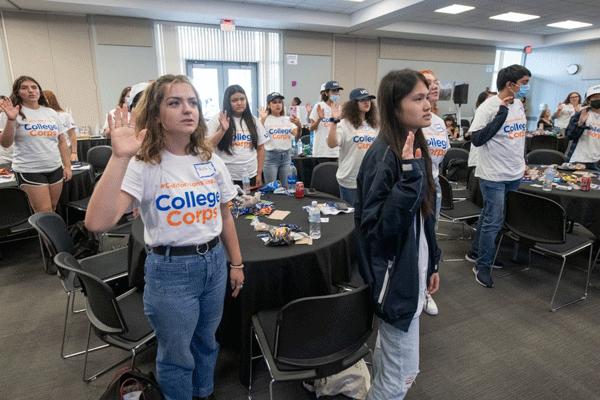
In response to the national student debt crisis, the State of California has developed a new program, called #CaliforniansForAll College Corps, to help low-income students pay for their college education. UCI is proud to be in the first cohort of California colleges and universities to participate in the program. Eligible UCI students can earn up to $10,000 toward their expenses by volunteering to work in food insecurity or climate action nonprofit organizations. UCI College Corps supports our intentional agenda to provide access to all regardless of economic circumstance and our commitment to public service, and addresses challenges all Californians face, particularly in historically underserved communities.
Recent grant success
Our faculty continues to do a tremendous job of winning research grants, the lifeblood of our research efforts. In just the last couple of months three chemists received a combined $25 million from the U.S. Department of Energy; our renowned Institute for Memory Impairments and Neurological Disorders, known as UCI MIND, received a grant of $47 million from the National Institute on Aging; an interdisciplinary UCI team will receive $10 million from the National Institutes of Health; and another team won a $13.8 million contract from the National Institute of Allergy and Infectious Diseases.
Additionally, the National Science Foundation awarded an interdisciplinary team of researchers $7.5 million for a project centering on environmental justice and community engagement in Earth system science research and education; and three young scientists were selected by the National Institutes of Health to receive NIH Director’s New Innovator Awards, bringing a total of $7 million to UCI for research projects in biology and biomedical engineering.
That’s a total of $110 million in new research funding in just two months! Clearly, the future of science at UCI is very bright indeed.
Susan Samueli Integrative Health Institute opening
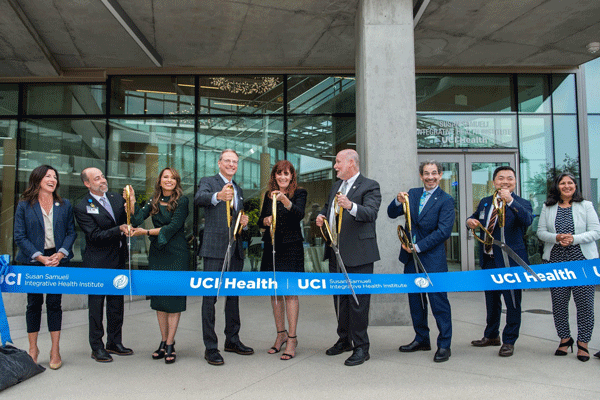
Two weeks ago we celebrated the opening of the new home of the Susan Samueli Integrated Health Institute, the first of the new facilities in our rapidly expanding Health Sciences District to open. Embedded within the new Susan & Henry Samueli College of Health Sciences’ 110,000-square-foot complex, on the corner of California Avenue and Michael Drake Drive, the SSIHI offers spaces for innovative student instruction; multidisciplinary, collaborative research; engaging community education; and team-based, whole-person clinical care. This will be followed next year by the opening of the Susan & Henry Samueli College of Health Sciences building and the Sue & Bill Gross School of Nursing building, along with the start of construction of the Falling Leaves Foundation Medical Innovation Building. This is where faculty across the health science disciplines will interact daily, where students will move out of their silos and learn about their counterparts, and where integrative health will come to life on the academic side.
New Susan Samueli Integrative Health Institute on UCI campus advances whole-person careDean Tyrus Miller writes on critical theory
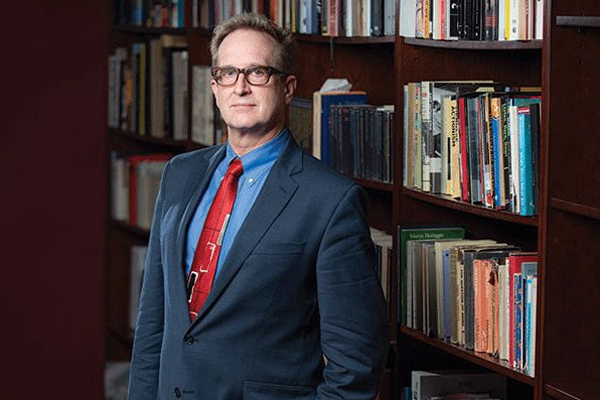
Opening opportunities for women in STEM
Increasing the number of women scientists in STEM fields is a major goal of UCI’s scientific and engineering community. Earlier this month, the School of Physical Sciences welcomed 53 female students from Santa Ana’s Godinez Fundamental High School for the first-ever EmpowHER (Empowering Women through High School Engagement and STEM Research) conference. The young students learned about various STEM majors, research and career pathways, and how to build confidence in pursuing a STEM pathway. After the event, each one was matched with a UCI student mentor who will provide support as she explores options for college and navigating STEM coursework and beyond.
Maya Silverman, a doctoral student in the Department of Astronomy & Astronomy, received the Women in Natural Sciences Award from the School of Physical Sciences for her work advancing diversity, equity, and inclusion. Ms. Silverman is the program administrator of the Rising Stargirls outreach program, which provides opportunities for middle school girls from underrepresented backgrounds to learn about physics and astronomy. She also serves on her department’s Committee on Inclusive Excellence; is a fellow of Physics & Astronomy Community Excellence, which helps new graduate students in the department receive the kind of mentoring they need to flourish at UCI; and a regular participant in workshops geared toward learning from other universities how to better augment DEI efforts in her department. Congratulations, Maya!
Professor Ogunseitan appointed to WHO committee
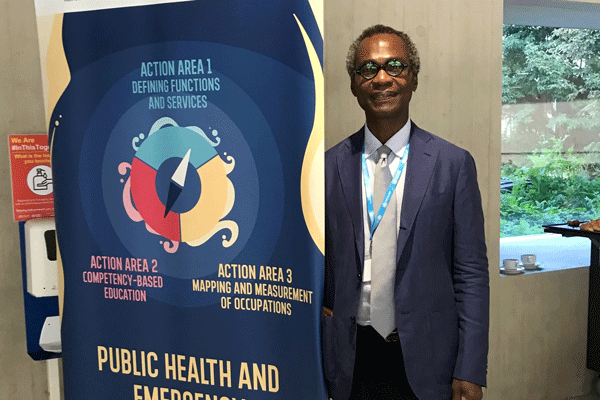
The COVID-19 pandemic and previous public health emergencies exposed health system weaknesses around the world. Many countries struggled to deliver essential public health functions. To solve this problem, the WHO developed a roadmap for strengthening the public health and emergency workforce. Oladele Ogunseitan, UC Presidential Chair and professor of population health and disease prevention with the UCI Program in Public Health, has been appointed by the World Health Organization to serve on the inaugural steering committee of the public health and emergency response roadmap. Among other charges, committee members will communicate the progress of the roadmap; strengthen the engagement of world-class universities and institutions relevant to public health; discuss the mobilization of financial resources for the implementation of two-year actions; and share insights and perspectives on other issues related to the achievement of the roadmap action plan. Professor Ogunseitan brings great credit to this university with his important service.
Dele Ogunseitan appointed to WHO Committee to address public health and emergency responseHSI Fulbright leader two years in a row
UCI has been named a 2022 Fulbright HSI Leader by the U.S. Department of State’s Bureau of Educational and Cultural Affairs. Last year, UCI was an inaugural recipient of the newly created designation, which recognizes the noteworthy engagement that selected Hispanic-Serving Institutions have achieved with the Fulbright Program, the federal government’s flagship international educational exchange program. HSIs are federally designated colleges or universities at which Hispanic students make up at least 25 percent of the full-time-equivalent student body and at which at least half of all students receive financial aid. UCI has been an HSI since 2017 and is one of only four members of the Association of American Universities – which includes the country’s leading research institutions – to be named an HSI.
African American Art Song conference
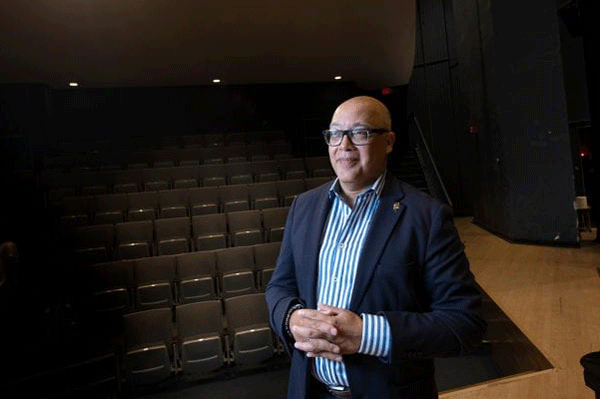
Earlier this month, UCI’s Department of Music hosted the 25th anniversary African American Art Song Alliance conference. The four-day event was presented by the African American Art Song Alliance, an advocacy organization representing Black composers of Western classical art songs. It was the fourth consecutive African American Art Song Alliance conference to be held at UCI, where it has taken place every five years since being founded here by Darryl Taylor, UCI professor of music, one of the most widely recorded performers of art song. Art song – or lieder, as it was originally called in the 19th century in Germany, where it originated – typically includes a vocalist accompanied by a piano or small instrumental ensemble.
Amplifying a classic Black music genreReflections of a Nobel laureate
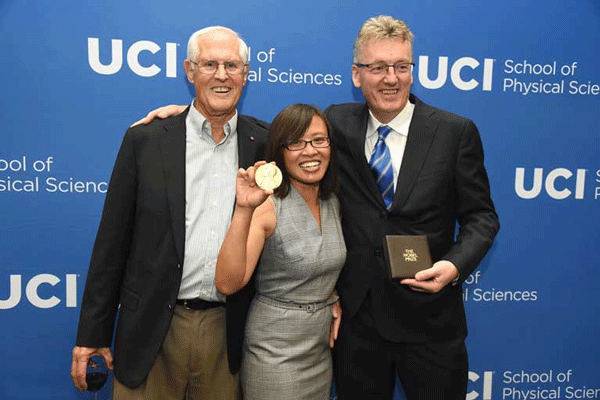
In the spring of 1989, chemistry professor Hal Moore received a letter from a young student in Scotland, asking to pursue doctoral studies with him. Professor Moore wrote back, saying it doesn’t work that way and enclosing an application. Some months later, the student, David MacMillan, arrived at UCI, where he joined Professor Larry Overman’s lab to study organic chemistry. Flash forward to last fall, when that same student, now Sir David MacMillan and the James S. McDonnell Distinguished University Professor of Chemistry at Princeton University, was awarded the 2021 Nobel Prize in Chemistry for his work in developing better catalysts for converting and building molecules. He is UCI’s fifth Nobel laureate. In this engaging remembrance, Professor MacMillan reflects on the importance of his time at UCI. “UCI changed my life in many ways, not least of which was setting me on a path to winning a Nobel Prize. But more importantly, it helped create a life for me, professionally and personally, that I could never have imagined...”
Creating a life that could never have been imagined. That’s a pretty good description of what we do here at UCI.
Fiat Lux,
Chancellor Howard Gillman